#Financial reporting Uae
Text
Navigating the intricate landscape of financial management in the UAE presents
Navigating the intricate landscape of financial management in the UAE presents a unique set of challenges and opportunities for businesses of all sizes. From startups finding their footing to established multinational enterprises, grasping the significance of robust accounting practices, tax obligations, and VAT regulations is paramount.
Corporate Tax and VAT Dynamics in the UAE
Renowned for its tax-friendly environment, the UAE stands out for its absence of corporate and personal income taxes for most entities and individuals. However, nuanced tax regulations apply to specific industries and activities. Typically, businesses face a 20% corporate tax rate on taxable profits, while a 5% VAT is standard for most goods and services unless exemptions or zero-rated categories apply.
Exemplary VAT Consulting Support in the UAE
Navigating the intricacies of VAT compliance and optimization demands specialized expertise. FST Accounting emerges as a beacon of proficiency in Financial Consulting in the UAE. Leveraging a profound understanding of UAE tax frameworks and extensive hands-on experience, FST Accounting delivers tailor-made VAT consulting solutions, ensuring compliance and strategic tax maneuvering.
VAT Accounting Precision in the UAE
Accurate VAT accounting stands as a cornerstone for businesses operating in the UAE. VAT-registered entities must meticulously record transactions, apply the appropriate VAT rates, and diligently submit VAT returns to the Federal Tax Authority (FTA). FST Accounting steps in with comprehensive VAT accounting services, safeguarding compliance and fortifying tax positions.
UAE Corporate Tax Landscape Unveiled
While the UAE predominantly refrains from corporate income tax imposition, specific sectors like oil and gas entities and branches of foreign banks face corporate tax obligations. It's imperative for businesses within these realms to grasp their tax responsibilities and engage professional counsel for seamless implementation.
Diving into VAT Varieties
Within the UAE, VAT treatments primarily fall into two categories: standard-rated and zero-rated supplies. Standard-rated supplies incur a 5% VAT, while zero-rated supplies enjoy a 0% VAT rate. Examples of zero-rated supplies encompass select exports, international transportation, and healthcare services.
Embracing Excellence in Financial Management
For dependable accounting services, adept financial consulting, and meticulous tax preparation in the UAE, enterprises entrust FST Accounting. Serving as a conduit for success and compliance, FST Accounting emerges as the partner of choice in navigating the intricate realm of UAE financial regulations.
Tagged: Accounting services in UAE, Financial consulting in UAE, Tax preparation in UAE
#Accounting services Uae#Financial consulting Uae#Tax preparation uae#Bookkeeping solutions Uae#Small business accounting Uae#Payroll management Uae#Auditing services Uae#Tax planning Uae#Financial reporting Uae#CPA services Uae#Budgeting and forecasting Uae#Business advisory Uae#Financial analysis Uae#QuickBooks consulting Uae#Tax compliance Uae#certified accountant near me#cpa accountant near me#accountants near me#tax accountant near me#accounting services
0 notes
Text
10 Tips for a Comprehensive Feasibility Study in UAE
Discover 10 essential tips for conducting a comprehensive feasibility study in UAE. Learn how to effectively assess market demand, financial viability, technical requirements, legal factors, and more for successful business ventures.
#Feasibility study in UAE#feasibility study services#feasibility studies in uae#financial feasibility study services#feasibility analysis study#feasibility study report
0 notes
Text
financial reporting services in uae
financial reporting services in uae
Experience real-time data visualization, intelligent analytics, and seamless reporting to make informed financial decisions with ease.
0 notes
Text
Comprehensive Bookkeeping Services in the UAE

Our Bookkeeping services in the UAE deliver meticulous financial record-keeping and reporting, complying with local regulations. Our expert team ensures accurate financial management for businesses, enhancing their fiscal efficiency and compliance.
#UAE Bookkeeping Services#Financial Record-Keeping UAE#Accounting and Bookkeeping UAE#UAE Financial Reporting#Professional Bookkeepers UAE
0 notes
Text
Do you want to know about the financial report of your company?
We offer comprehensive accounting and financial reports that provide you with all the information. If you are looking for a reliable partner who offers high-quality services at affordable rates, then SNR Associates are the right choice. You can trust us because we have years of experience in preparing professional business reports.
0 notes
Text
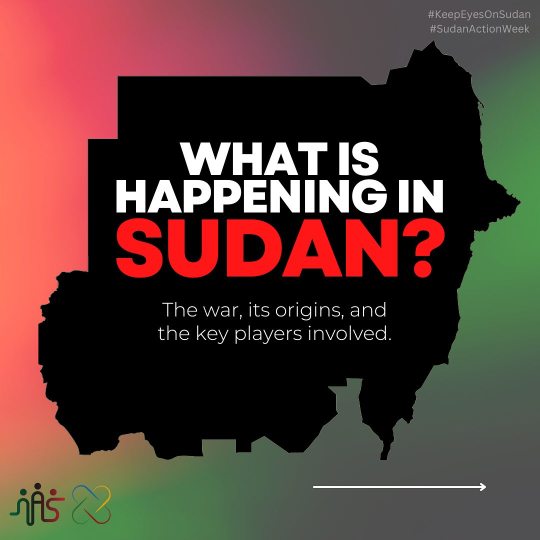
Via NasAlSudan
December 17 2023. #KeepEyesOnSudan #SudanActionWeek
Swipe through to build a foundational understanding of the war, its origins, and the key players involved. For actionable ways to support those in Sudan, check the link in our bio. Stay tuned for more posts this week.
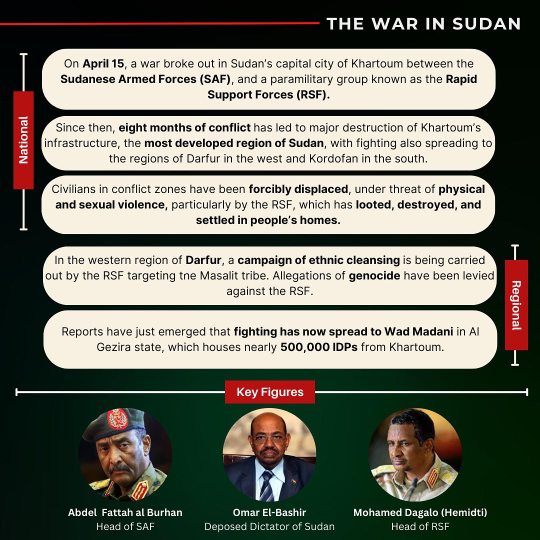
Transcript:
National:
On April 15, a war broke out in Sudan's capital city of Khartoum between the Sudanese Armed Forces (SAF), and a paramilitary group known as the Rapid Support Forces (RSF).
Since then, eight months of conflict has led to major destruction of Khartoum's infrastructure, the most developed region of Sudan, with fighting also spreading to the regions of Darfur in the west and Kordofan in the south.
Civilians in conflict zones have been forcibly displaced, under threat of physical and sexual violence, particularly by the RSF, which has looted, destroyed, and settled in people's homes.
Regional:
In the western region of Darfur, a campaign of ethnic cleansing is being carried out by the RSF targeting the Masalit tribe. Allegations of genocide have been levied against the RSF.
Reports have just emerged that fighting has now spread to Wad Madani in Al Gezira state, which houses nearly 500,000 IDPs from Khartoum.
Key figures:
Abdel Fattah al Burhan Head of SAF
Omar El-Bashir Deposed Dictator of Sudan
Mohamed Dagalo (Hemidti) Head of RSF
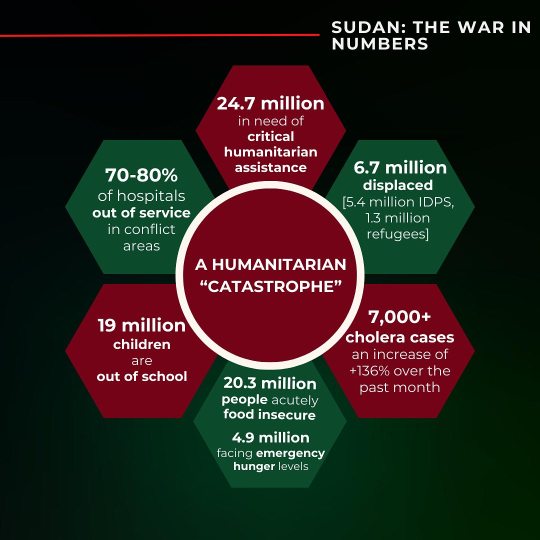
Transcript:
Sudan: the war in numbers
A humanitarian "catastrophe"
24.7 million in need of critical humanitarian assistance
70-80% of hospitals out of service in conflict areas
19 million children are out of school
20.3 million people acutely food insecure. 4.9 million facing emergency hunger levels
6.7 million displaced [5.4 million IDPS, 1.3 million refugees]
7,000+ cholera cases an increase of +136% over the past month
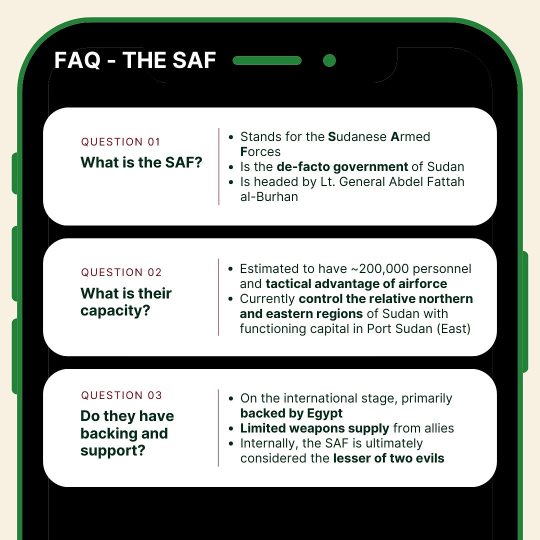
Transcript:
FAQ - THE SAF
QUESTION 01: What is the SAF?
Stands for the Sudanese Armed Forces
Is the de-facto government of Sudan
Is headed by Lt. General Abdel Fattah al-Burhan
QUESTION 02 What is their capacity?
Estimated to have ~200,000 personnel and tactical advantage of airforce
Currently control the relative northern and eastern regions of Sudan with functioning capital in Port Sudan (East)
QUESTION 03 Do they have backing and support?
On the international stage, primarily backed by Egypt
Limited weapons supply from allies
Internally, the SAF is ultimately considered the lesser of two evils
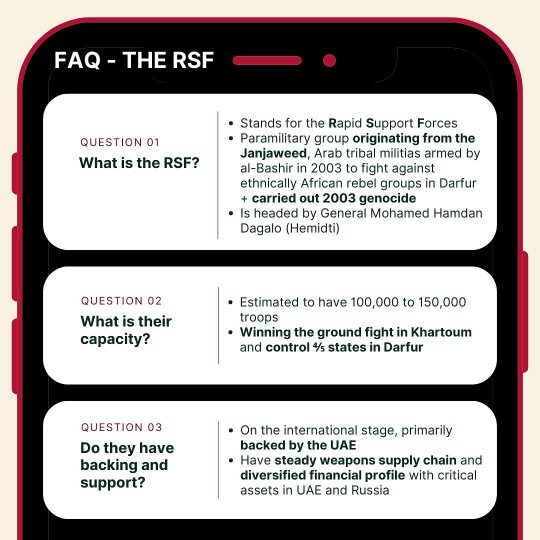
Transcript:
FAQ - THE RSF
QUESTION 01 What is the RSF?
Stands for the Rapid Support Forces
Paramilitary group originating from the Janjaweed, Arab tribal militias armed by al-Bashir in 2003 to fight against ethnically African rebel groups in Darfur + carried out 2003 genocide
Is headed by General Mohamed Hamdan Dagalo (Hemidti)
QUESTION 02 What is their capacity?
Estimated to have 100,000 to 150,000 troops
Winning the ground fight in Khartoum and control 4/5 states in Darfur
QUESTION 03 Do they have backing and support?
On the international stage, primarily backed by the UAE
Have steady weapons supply chain and diversified financial profile with critical assets in UAE and Russia
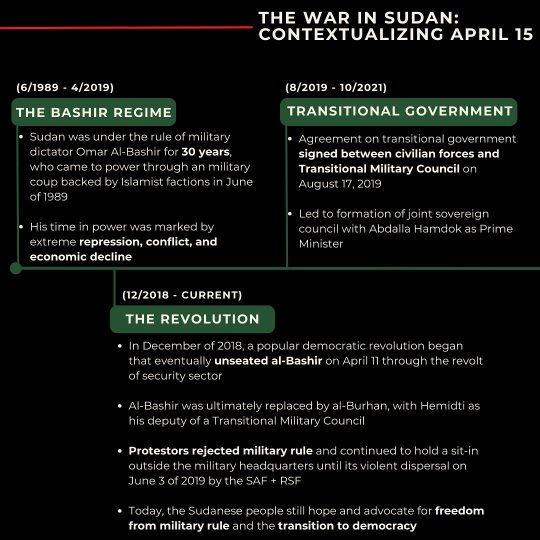
Transcript:
THE WAR IN SUDAN: CONTEXTUALIZING APRIL 15
(6/1989 - 4/2019) THE BASHIR REGIME
Sudan was under the rule of military dictator Omar Al-Bashir for 30 years, who came to power through an military coup backed by Islamist factions in June of 1989
His time in power was marked by extreme repression, conflict, and economic decline
(12/2018 CURRENT) THE REVOLUTION
In December of 2018, a popular democratic revolution began that eventually unseated al-Bashir on April 11 through the revolt of security sector
Al-Bashir was ultimately replaced by al-Burhan, with Hemidti as his deputy of a Transitional Military Council
Protestors rejected military rule and continued to hold a sit-in outside the military headquarters until its violent dispersal on June 3 of 2019 by the SAF + RSF
Today, the Sudanese people still hope and advocate for freedom from military rule and the transition to democracy
(8/2019-10/2021) TRANSITIONAL GOVERNMENT
Agreement on transitional government signed between civilian forces and Transitional Military Council on August 17, 2019
Led to formation of joint sovereign council with Abdalla Hamdok as Prime Minister
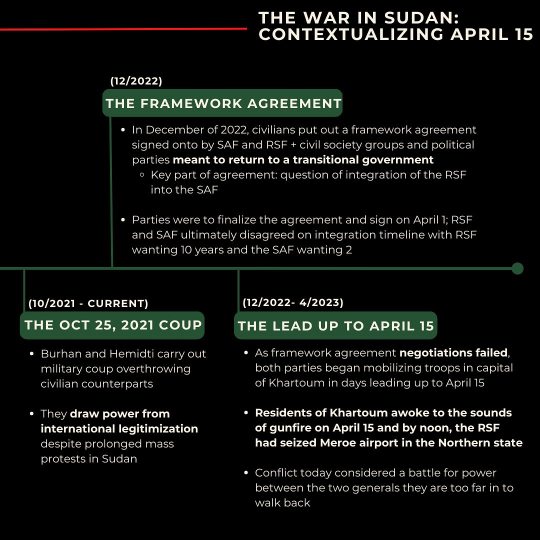
Transcript:
(10/2021 CURRENT)THE OCT 25, 2021 COUP
Burhan and Hemidti carry out military coup overthrowing civilian counterparts
They draw power from international legitimization despite prolonged mass protests in Sudan
(12/2022) THE FRAMEWORK AGREEMENT
In December of 2022, civilians put out a framework agreement signed onto by SAF and RSF + civil society groups and political parties meant to return to a transitional government
Key part of agreement: question of integration of the RSF into the SAF
Parties were to finalize the agreement and sign on April 1; RSF and SAF ultimately disagreed on integration timeline with RSF wanting 10 years and the SAF wanting 2
(12/2022-4/2023) THE LEAD UP TO APRIL 15
As framework agreement negotiations failed, both parties began mobilizing troops in capital of Khartoum in days leading up to April 15
Residents of Khartoum awoke to the sounds of gunfire on April 15 and by noon, the RSF had seized Meroe airport in the Northern state
Conflict today considered a battle for power between the two generals they are too far in to walk back

Transcript:
FRAMING ALLIANCES
Sudanese Armed Forces (SAF):
Egypt
Israel (Foreign Ministry)
Islamists
Iran
Saudi Arabia
Ukraine (SOF)
Armed Groups
Rebel groups that had taken up arms against the central government in the Bashir Era are forced to ally with the SAF due to the RSF's ethnic cleansing campaign. They include:
Justice and Equality Movement (Gibril Ibrahim)
Sudan Liberation Movement/Army (Minni Minawi)
Gathering of Sudan Liberation Forces (Abdallah Yahya)
Rapid Support Forces (RSF):
Israel (Mossad)
Libya (Khalifa Haftar)
United Arab Emirates
Central African Republic
Russia (Wagner Group)
Chad
Arab Tribal Leaders
Arab tribal leaders across the Western region of Darfur have pledged their allegiance and support to the RSF, with members of the tribes across the Sahel crossing into Sudan to join the RSF's assault as well.
Key tribes include: Beni Halba, Tarjam, Habaniya, Fallata, Misseriya, Taaysha, Rizeigat
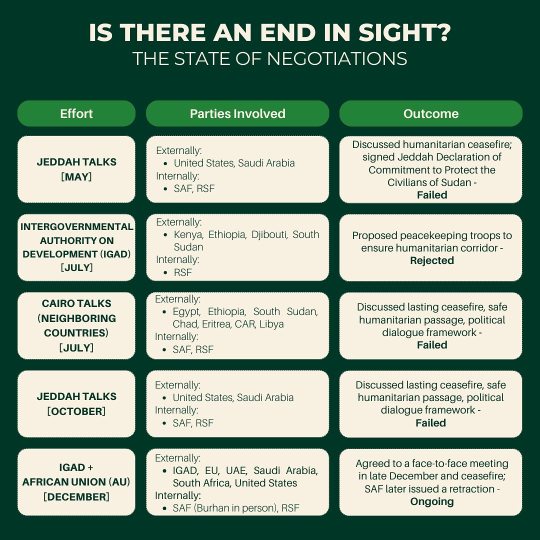
Transcript:
IS THERE AN END IN SIGHT?
THE STATE OF NEGOTIATIONS
Effort: JEDDAH TALKS [MAY]
Parties involved: Externally: United States, Saudi Arabia Internally: SAF, RSF
Outcome: Discussed humanitarian ceasefire; signed Jeddah Declaration of Commitment to Protect the Civilians of Sudan - Failed
Effort: INTERGOVERNMENTAL AUTHORITY ON DEVELOPMENT (IGAD) [JULY]
Parties Involved: Externally: Kenya, Ethiopia, Djibouti, South Sudan Internally: RSF
Outcome: Proposed peacekeeping troops to ensure humanitarian corridor - Rejected
Effort: CAIRO TALKS (NEIGHBORING COUNTRIES) [JULY]
Parties Involved: Externally: Egypt, Ethiopia, South Sudan, Chad, Eritrea, CAR, Libya Internally: SAF, RSF
Outcome: Discussed lasting ceasefire, safe humanitarian passage, political dialogue framework - Failed
Effort: JEDDAH TALKS [OCTOBER]
Parties Involved: Externally: United States, Saudi Arabia Internally: SAF, RSF
Outcome: Discussed lasting ceasefire, safe humanitarian passage, political dialogue framework - Failed
Effort: IGAD + AFRICAN UNION (AU) [DECEMBER]
Parties Involved: Externally: IGAD, EU, UAE, Saudi Arabia, South Africa, United States Internally: SAF (Burhan in person), RSF
Outcome: Agreed to a face-to-face meeting in late December and ceasefire; SAF later issued a retraction - Ongoing
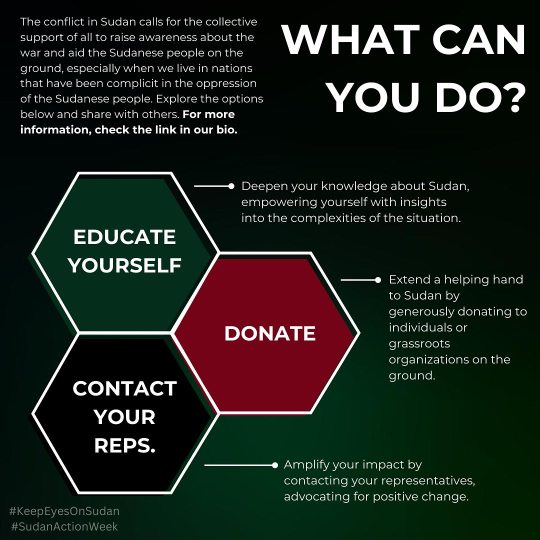
Transcript:
The conflict in Sudan calls for the collective support of all to raise awareness about the war and aid the Sudanese people on the ground, especially when we live in nations that have been complicit in the oppression of the Sudanese people. Explore the options below and share with others. For more information, check the link in our bio.
WHAT CAN YOU DO?
EDUCATE YOURSELF
Deepen your knowledge about Sudan, empowering yourself with insights into the complexities of the situation.
DONATE
Extend a helping hand to Sudan by generously donating to individuals or grassroots organizations on the ground.
CONTACT YOUR REPS.
Amplify your impact by contacting your representatives, advocating for positive change.
#sudan#keep eyes on sudan#KeepEyesOnSudan#Sudan Action Week#SudanActionWeek#i hope the way i formatted it is good#i saw a few hours ago that rsf retreated from wad madani outskirts
370 notes
·
View notes
Text
Let's talk about Sudan-
TRANSCRIPT UNDER CUT

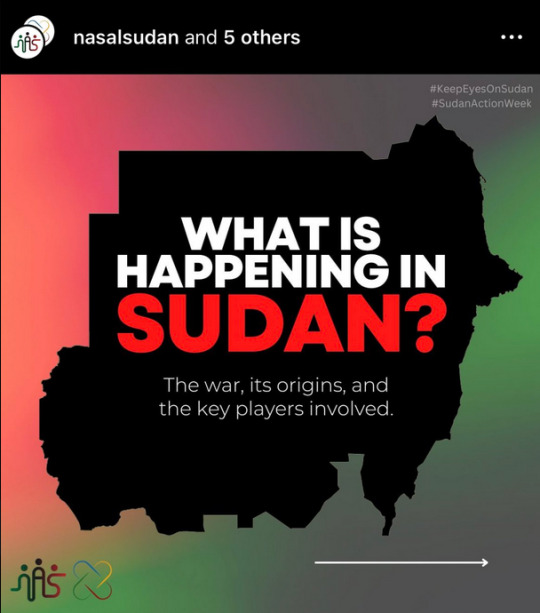
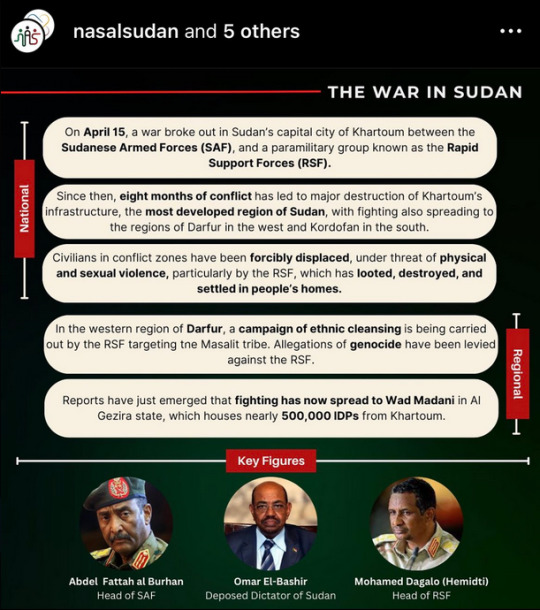
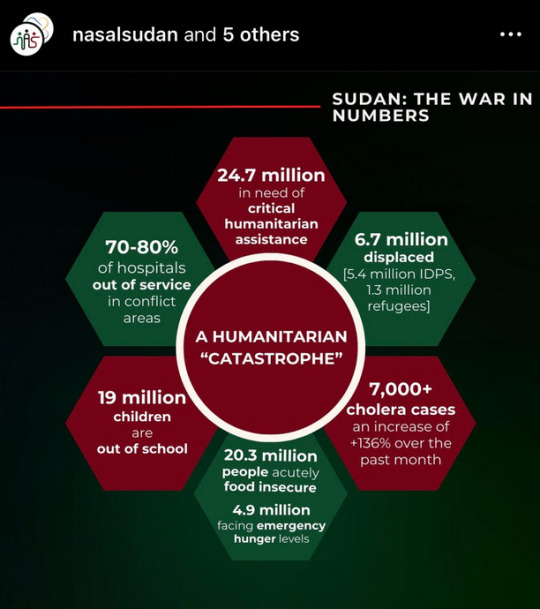

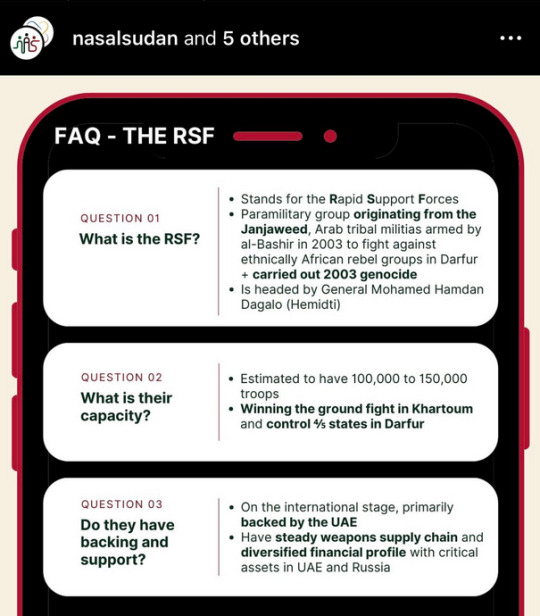
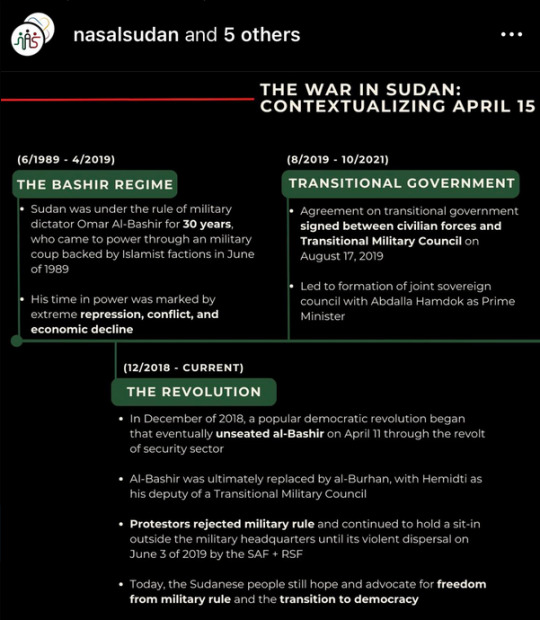
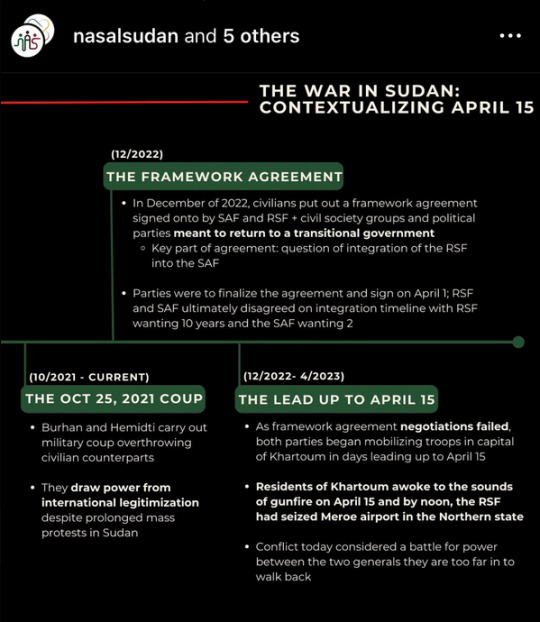
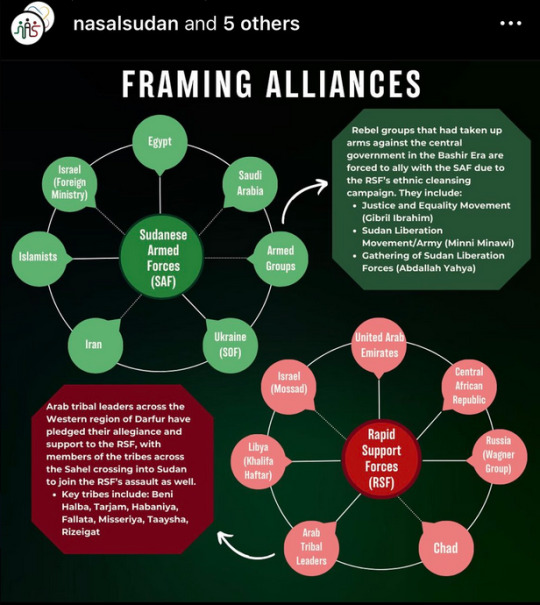
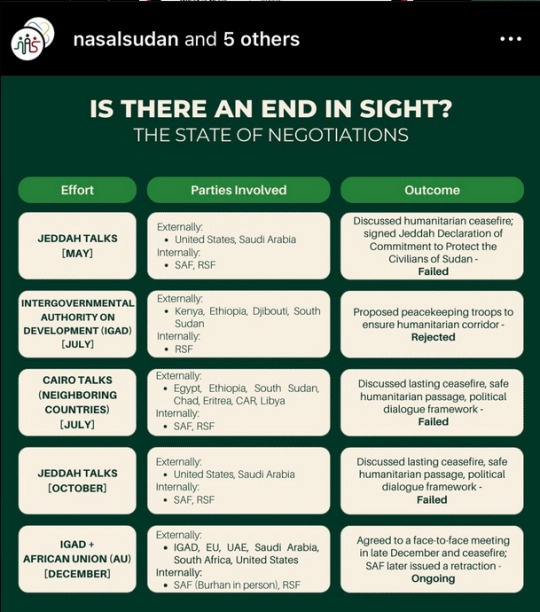
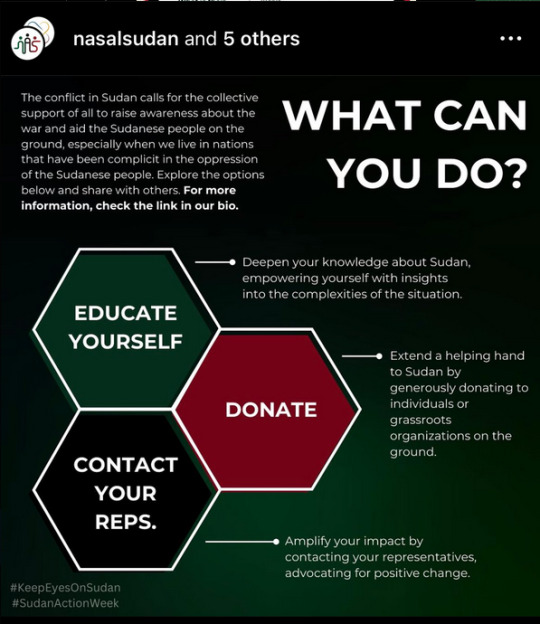
Transcript:
What is happening in Sudan?
The war, its origins, and the key players involved.
The war in Sudan
On April 15, a war broke out in Sudan's capital city of Khartoum between the Sudanese Armed Forces (SAF), and a paramilitary group known as the Rapid Support Forces (RSF).
Since then, eight months of conflict has led to major destruction of Khartoum's infrastructure, the most developed region of Sudan, with fighting also spreading to the regions of Darfur in the west and Kordofan in the south.
Civilians in conflict zones have been forcibly displaced, under threat of physical and sexual violence, particulary by the RSF, which has looted, destroyed, and settled in people's homes.
In the western region of Darfur, a campaign of ethnic cleansing is being carried out by the RSF targeting the Masalit tribe. Allegations of genocide have been levied against the RSF.
Reports have just emerged that fighting has now spread to Wad Madani in AI Gazira state, which houses nearly 500,00 IDPs from Khartoum.
Key Figures: Abdel Fattah al Burhan (head of SAF), Omar El-Bashir (deposed dictator of Sudan), Mohamed Dagalo (Hemidti) (head of RSF)
Sudan: the war in numbers
24.7 million in need of critical humanitarian assistance
6.7 million displaced [5.4 million IDPS, 1.3 million refugees]
7,000+ cholera cases an increase of +136% over the past month
20.3 million people acutely food insecure- 4.9 million facing emergency hunger levels
19 million children are out of school
70-80% of hospitals out of service in conflict areas
FAQ - THE SAF
What is the SAF?
stands fro the Sudanese Armed Forces
is the de-facto government of Sudan
is headed by Lt. General Abdel Fattah al-Burhan
What is their capacity?
estimated to have aprox. 200,000 personnel and tactical advantage of airforce
currently control of relative northern and eastern regions of Sudan with functioning capital in Port Sudan (East)
Do they have backing and support?
on the international stage, primarily backed by Egypt
limited weapons supply from allies
internally, the SAF is ultimately considered the lesser of two evils
FAQ - THE RSF
What is the RSF?
stands fro Rapid Support Forces
paramilitary group originating from the Janjaweed, Arab tribal militias armed by al-Bashir in 2003 to fight against ethnically African rebel groups in Darfur + carried out 2003 genocide
is headed by General Mohamed Hamdan Dagalo (Hemidti)
What is their capacity?
estimated to have 100,000 to 150,000 troops
winning the ground fight in Khartoum and control 4/5 states in Darfur
Do they have backing and support?
on the international stage, primarily backed by the UAE
have steady weapons supply chain and diversified financial profile with critical assets in UAE and Russia
The war in Sudan: contextualizing April 15
6/1989 - 4/2019 - The Bashir Regime
Sudan was under the rule of military dictator Omar Al-Bashir for 30 years, who came to power through an military coup backed by Islamist factions in June of 1989
His time in power was marked by extreme repression, conflict, and economic decline
12/2018 - current - The revolution
In December of 2018, a popular democratic revolution began taht eventually unseated al-Bashir on April 11 through the revolt of security sector
Al-Bashir was ultimately replaced by al-Burhan, with Hemidti as his deputy of a Transitional Military Council
Protestors rejected military rule and continued to hold a sit-in outside the military headquarters until its violent dispersal on June 3 of 2019 by the SAF + RSF
Today, the Sudanese people still hope and advocate for freedom from the military rule and the transition to democracy
8/2019 - 10/2021 - Transitional Government
Agreement on transitional government signed between civilian forces and Transitional Military Council on August 17, 2019
Led to formation to joint sovereign council with Abdalla Hamdok as Prime Minister
10/2021 - Current - The Oct 25, 2021 Coup
Burhan and Hemidti carry out military coup overthrowing civilian counterparts
They draw power from international legitimization despite prolonged mass protests in Sudan
12/2022- The Framework Agreement
In December of 2022, civilians put out a framework agreement signed onto by SAF and RSF + civil society groups and political parties meant to return to a transitional government - key part of agreement: question of integration of the RSF into the SAF
Parties were to finalize the agreement and sign on April 1; RSF and SAF ultimately disagreed on the integration timeline with RSF wanting 10 years and the SAF wanting 2
12/2022-4/2023 - The Lead up to April 15
As framework agreement negotiations failed, both parties began mobilizing troops in capital of Khartoum in days leading up to April 15
Residents of Khartoum awoke to the sounds of gunfire on April 15 and by noon, the RSF had seized Meroe airport in the Northern state
Conflict today considered a battle of power between the two generals they are too far in to walk back
Framing alliances
Sudnese Armed Forces (SAF):
Saudi Arabia
armed groups- rebel groups that had taken up arms against the central government in the Bashir Era are forced to ally with the SAF due to the RSF's ethnic cleansing campaign. They include: Justice and Equality Movement (Gibril Ibrahim), Sudan Liberation Movement/Army (Minni Minawi), Gathering of Sudan Liberation Forces (Abdallah Yahya)
Ukraine (SOF)
Iran
Islamists
Israel (Foreign Ministry)
Egypt
Rapid Support Forces (RSF):
United Arab Emirates
Central African Republic
Russia (Wagner Group)
Chad
Arab Tribal Leaders- Arab tribal leaders across the Western region of Darfur have pledged their allegiance and support to the RSF, with members of the tribes across the Sahel crossing into Sudan to join the RSF's assault as well. Key tribes include: Beni Halba, Tarjam, Habaniya, Fallata, Misseriya, Taaysha, Rizeigat
Libya (Khalifa Haftar)
Israel (Mossad)
Is there an end in sight?
The state of negotiations
Effort- Jeddah Talks [May]
Parties Involved- Externally: United States, Saudi Arabia. Internally: SAF, RSF
Outcome: discussed humanitarian ceasefire; signed Jeddah Declaration of Commitment to Protect the Civilians of Sudan- FAILED
Effort- Intergovernmental authority on development (IGAD) [July]
Parties Involved- Externally: Kenya, Ethiopia, Djibouti, South Sudan . Internally: RSF
Outcome: proposed peacekeeping troops to ensure humanitarian corridor-REJECTED
Effort- Cairo talks (neighboring countries) [July]
Parties Involved- Externally: Egypt, Ethiopia, South Sudan, Chad, Eritrea, CAR, Libya. Internally: SAF, RSF
Outcome: discussed lasting ceasefire, safe humanitarian passage, political dialogue framework-FAILED
Effort- Jeddah talks [October]
Parties Involved- Externally: United States, Saudi Arabia . Internally: SAF, RSF
Outcome: discussed lasting ceasefire, safe humanitarian passage, political dialogue framework-FAILED
Effort- IGAD + African Union (AU) [December]
Parties Involved- Externally: IGAD, EU, UAE, Saudi Arabia, South Africa, United States. Internally: SAF (Burhan in person), RSF
Outcome: agreed to face-to-face meeting in late December and ceasefire; SAF later issued a retraction-ONGOING
What can you do?
The conflict in Sudan calls for the collective support of all to raise awareness about war and aid the Sudanese people on the ground, especially when we live in nations that have been complicit in the oppression of the Sudanese people. Explore the potions below and share with others.
Educate yourself- deepen your knowledge about Sudan, empowering yourself with insights into the complexities of the situation.
Donate- extend a helping hand to Sudan by generously donation to individuals or grassroots organizations on the ground.
Contact your reps- amplify your impact by contacting your representatives, avocating for positive change
221 notes
·
View notes
Note
The CEO of Telegram was just arrested in a parisian airport for a lack of moderation on his platform. As always, love how proactive my country is when it comes to stifling liberty.
We're just abandoning this over in France then, it had a nice long run as a slogan I guess.

Let's have a look
Pavel Durov, the co-founder and chief executive of the messaging service Telegram, was arrested and detained on Saturday, according to French media reports.
The Paris prosecutor's office told NPR that a statement about the matter will be issued on Monday.
Law enforcement agents reportedly arrested Durov at Le Bourget Airport outside of Paris, where he was arriving on his private jet from Azerbaijan, according to multiple French press reports.
AFP reported that an arrest warrant had been issued for Durov as a result of an investigation into whether he has failed to crack down on illegal activity including drug trafficking, the promotion of terrorism and fraud on Telegram.
The French newspaper Le Monde reported that the probe is examining whether Durov has refused to cooperate with law enforcement over issues including cyberscams and the spread of child pornography on Telegram.
The Russian Embassy in France released a statement saying it had asked French authorities for an explanation for Durov's detention and asked that his rights be protected and consular access be granted.
Durov, a 39-year-old Russian-born billionaire, is a dual citizen of France and the United Arab Emirates, where he runs Telegram, the Dubai-based messaging service with nearly 1 billion global users.
He is considered “Russia’s Mark Zuckerberg” for in 2007 founding VKontakte, Russian for “in touch,” a Facebook copycat site that became the country’s most popular social network.
In 2013, Durov and his brother, Nikolai, launched Telegram. Pavel Durov fled Russia a year later after his refusal to hand over data on Ukrainian users of VK to Russian authorities.
When Telegram first started, cryptocurrency fanatics were quick to embrace it, and the app has since risen to become one of the most popular messaging services in the world. It has emerged as a go-to place for unfiltered updates on the wars in Ukraine and Gaza.
Telegram has a laissez-faire approach to moderating content, which has drawn concern from researchers, who have noted how misinformation, extremism and illicit activity, like drug sales and child pornography, often goes unmoderated.
Some experts have even suspected that Telegram might have links to the Kremlin, which Durov called “inaccurate” in an interview in March with the Financial Times, the first time the reclusive CEO has spoken to the press since 2017.
On Durov’s Instagram, he is often photographed bare-chested, showing off his muscular physique in desert landscapes or posing in infinity pools.
He is regularly seen sporting all-black outfits in an apparent nod to the character Neo from the movie The Matrix.
Content on Telegram ricochets around the web when it is shared to other social networks, where it can often be subject to the content moderation rules of other platforms. But Durov has long championed Telegram as an anything-goes service, with Durov’s supporters hailing him as a free speech hero.
______________________________
Cyberscams are everywhere, got 8 new asks in my inbox since signing out last night and 6 are cyberscams, CP is a different story if that's getting a pass then that's 100% something that needs to be fixed.
I don't use telegram so I don't know what level of moderation if any exists on there, I do know that's one of the ways people get things that normally wouldn't make their way out into the world out there which is good for real information.
15 notes
·
View notes
Text
Sudan, already ravaged by a disastrous war, is now suffering from a failed, politicized humanitarian response.
The ongoing crisis there has reached catastrophic proportions, yet the international community’s response remains woefully inadequate. A series of missteps and political maneuvers have undermined efforts to provide meaningful assistance to those in desperate need, and the Rapid Support Forces (RSF), the paramilitary group responsible for much of the violence, has yet to be held accountable for actively destroying the country’s food reserves. The situation demands immediate attention and a drastic shift in approach from global leaders and institutions.
At the core of this failure is the United Nations Security Council’s persistent delays in addressing findings from its own Panel of Experts on Sudan. These findings document “credible” allegations of the United Arab Emirates’ involvement in violating Darfur’s arms embargo by supplying the RSF with weapons and ammunition. Furthermore, the Guardian reported that U.K. government officials have been blocking discussions of the UAE’s involvement in the Security Council for months—including after the Labour Party took power in July.
This procrastination not only undermines the urgency of the crisis, but also permits potential external interference to continue unchecked. The Security Council’s inaction sends a troubling message about the international community’s commitment to resolving the conflict and protecting Sudanese civilians.
While diplomatic efforts are crucial, these discussions offer no new mechanisms to enforce an end to attacks on civilians. The U.S. special envoy for Sudan, Tom Perriello, has failed to provide any concrete mechanisms for enforcing last year’s Jeddah declaration, which required the protection of civilians and specifically committed the RSF and rival Sudanese Armed Forces (SAF) to vacating and refraining from occupying public and private facilities. Perriello simply noted in an interview on X earlier this month that the UAE and Egypt will attend the latest round of talks, held in Geneva in mid-August.
Yet there is no substantial pressure being applied on the UAE. Without concrete measures to protect the Sudanese people, such talks risk becoming little more than performative gestures, failing to address the immediate suffering on the ground. The Sudanese government boycotted the Geneva talks after the UAE was added as a mediator, despite its continued military support to the RSF. Additionally, U.S. rapper Macklemore canceled his October show in Dubai to protest the UAE’s destructive role in the Sudan conflict.
The international community’s financial response has been equally disheartening. Despite numerous humanitarian conferences, only a fraction of the $4.1 billion appeal made by the U.N. in February 2024 has been met. This severe underfunding leaves millions of Sudanese refugees and internally displaced persons without essential support, exacerbating an already dire situation. The stark contrast between the promises made at these conferences and the actual aid delivered reveals a troubling gap between rhetoric and action.
The lack of accountability for those perpetrating violence and weaponizing famine is exacerbating Sudan’s crisis. The RSF, responsible for much of the destruction, continues to operate with impunity, actively destroying the country’s food reserves. Since the RSF took control of the state of Jazirah, the country’s farming center, in December, the nation has been grappling with humanmade famine. Farmers in the state have reported a near-complete loss of cotton and wheat crops due to RSF control.
In contrast, areas that remain under SAF control saw normal crops. According to local reports in Jazirah, the RSF pushed local farmers to harvest crops only to confiscate them and transport the yields out of the state for their own benefit.
On June 26, the RSF advanced on the southeastern trading hub of Sennar, seeking to expand its territorial gains more than 14 months into its war with the Sudanese army. This move forced the displacement of more than 150,000 people living in the state, many of whom had fled from Jazirah during the RSF invasion in December 2023. The militia also targeted Sennar’s agricultural project and food reserves, further deepening the humanitarian crisis and undermining efforts toward stabilization and peace.
Doctors Without Borders (or Médecins Sans Frontières, the MSF) reports that the RSF is targeting local hospitals and blocking aid in Darfur. Outside the city of El Fasher, where more than 800,000 civilians are trapped by the RSF, MSF supply trucks have been held in the nearby town of Kabkabiya by the RSF for the past four weeks. This blockade threatens to leave the Saudi Hospital, one of the last working health facilities in El Fasher, without critical supplies.
This deliberate targeting of essential resources not only worsens the humanitarian crisis, but also underscores the urgent need for international intervention to implement the U.N. arms embargo in Darfur and stop the alleged UAE arms supply to the RSF through Chad.
Moreover, it is crucial to halt the alleged UAE arms supply to the RSF through Chad, particularly at Amdjarass’s airport, a small town in eastern Chad where UAE air cargo planes reportedly land and unload weapons that are then transported across the border to RSF strongholds in Darfur.
Political maneuvering has further complicated efforts to address the crisis effectively. Actions such as the United Kingdom’s reported intervention to alter the format of U.N. Security Council meetings have prevented Sudan from directly presenting its case, prioritizing commercial interests with the UAE over humanitarian concerns.
Al-Harith Idriss, Sudan’s permanent representative to the U.N., asked for an urgent Security Council meeting on April 26 in response to what he described as UAE “aggression” against his nation. However, the U.K., serving as the current penholder on Sudan in the Security Council, intervened to change the meeting’s agenda and format to closed consultations. As a result, Idriss was not allowed to attend the meeting, which ultimately took place on April 29.
During these secret discussions, U.N. Security Council members issued a statement urging the RSF to commit to refraining from attacking any cities and to end the violence surrounding El Fasher. On another occasion, the Guardian reported that the U.K. government has been actively discouraging African states from criticizing the UAE. Such actions erode trust in international institutions and their ability to respond impartially to crises.
The current approach to Sudan’s war is failing. The international community must prioritize the protection of civilians, punish perpetrators of violence, and deliver on financial commitments. The UAE and its proxy, the RSF, must be held accountable for their alleged crimes and, in the case of the latter, attacks on civilians in Sudan. The five permanent members of the U.N. Security Council should publicly address the UAE’s reported support of RSF crimes and the Emirati government’s violation of the international arms embargo in Darfur.
Furthermore, international human rights organizations should take Abu Dhabi to court for its alleged crimes against Sudanese civilians. The UAE’s ongoing arms supply has enabled the RSF to carry out ethnic cleansing in Darfur and commit massacres in Khartoum, Jazira, and Sennar.
Some actions have already been taken. The Raoul Wallenberg Centre for Human Rights is campaigning to hold the UAE accountable in the International Court of Justice or through other legal avenues, such as in Germany or the European Court of Human Rights. Additionally, the International Criminal Court should leverage its existing jurisdiction over Darfur to prosecute crimes against humanity in the region. But more must be done. A concerted, unified international effort to address the root causes of the conflict could pave the way for lasting peace and stability and alleviate the suffering of the Sudanese people.
7 notes
·
View notes
Text
In a recent report by TASS, a major state-owned news agency in Russia, Valentina Matviyenko, the Speaker of Russia’s Federation Council, announced significant progress on the BRICS digital payment platform, an initiative that could potentially revolutionize global financial transactions. This development comes as Russia continues to navigate the challenges of extensive international sanctions and its exclusion from the SWIFT payment network. BRICS is an acronym representing a coalition of five major emerging economies: Brazil, Russia, India, China, and South Africa. The term was first introduced in 2001 by economist Jim O’Neill to describe these rapidly growing economies, which were expected to become dominant players in the global market. Over time, BRICS evolved from a concept into a formal intergovernmental organization, with its member countries cooperating on various fronts, including economic development, political coordination, and cultural exchange. The group’s mission extends to advocating for the reform of international financial and political institutions to better reflect the shifting global power dynamics.
As of August 2024, BRICS has undergone a significant expansion. During the BRICS Summit held in Johannesburg in 2023, it was announced that six additional countries would join the group, bringing the total membership to eleven. The new members, effective January 1, 2024, include Argentina, Egypt, Ethiopia, Iran, Saudi Arabia, and the United Arab Emirates (UAE). This expansion underscores BRICS’ growing influence and strategic importance on the world stage.
The inclusion of these new members aligns with BRICS’ long-term goal of creating a more balanced global economic order, offering a counterweight to Western-dominated institutions like the International Monetary Fund (IMF) and the World Bank. By expanding its membership, BRICS aims to enhance cooperation among a broader spectrum of emerging economies, addressing global financial inequalities and promoting more inclusive international governance.
Per the TASS report, during a press conference, Matviyenko provided details about the BRICS Bridge, an independent financial payment platform being developed within the BRICS nations. This standalone system is designed for mutual payments across BRICS countries, offering an alternative to existing global financial networks.
6 notes
·
View notes
Text
by Sean O'Driscoll
Newsweek found that one Yemeni business administrator is the joint owner of Hamas' UAE property company, which owned an office block worth $150 million; is the co-founder of a Hamas-linked, publicly traded Turkish construction company; owns 20 percent of a Hamas front company in Saudi Arabia; and is on the board of another Hamas-linked Sudanese company. Separately, company records show an accountant from the West Bank is central to four major construction and real estate companies in three countries: Turkey, Sudan and Saudi Arabia.
The network appears to be growing. A wealthy Sudanese businessman who had close ties to Osama bin Laden, the late Al-Qaeda leader, and who is described by the U.S. Treasury Department as a "Hamas financier," set up a Hamas-linked company in Spain last December, corporate filings show.

The U.S. placed companies and executives on its Hamas sanctions list in 2022 and during three rounds of sanctions imposed on Hamas after the October 7 attack on Israel. That attack killed around 1,200 people, and militants took some 250 others hostage, the Associated Press reported. As of January 9, 2024, Israel's air, ground and sea assault in Gaza had killed more than 22,400 people, two-thirds of them women and children, the AP said, citing the Hamas-run Gaza Health Ministry. The offensive has devastated large parts of the Gaza Strip, displaced nearly 85 percent of its population of 2.3 million, and left a quarter of its residents facing starvation, according to the United Nations.
17 notes
·
View notes
Text
Navigating Tax/Vat Preparation and Bookkeeping Solutions in the UAE
At FST Accounting, we understand that tax preparation and bookkeeping aren't just checkboxes on your business to-do list. They're vital cogs in the wheel of your financial health and longevity. Our mission? To equip you with the savvy and strategies needed to not just comply with regulations, but to thrive financially, propelling your company toward growth and efficiency.
Let's Break It Down:
Tax Services: Picture us as your tax whisperers, guiding you through the maze of regulations with finesse. From nailing VAT compliance to crafting smart tax plans and filing spot-on returns, we've got your back.
Bookkeeping Solutions: Think of bookkeeping as the heartbeat of your financial operations. It's all about methodically logging and organizing your financial transactions. This clarity not only aids in decision-making but also keeps the regulators happy.
The Nuts and Bolts of Bookkeeping:
Step 1: We start by meticulously recording every transaction using top-notch accounting software tailored for the UAE market. Sales, purchases, expenses, payroll—you name it, we track it.
Step 2: Next, we sort and classify these records to whip up financial statements like balance sheets, profit and loss statements, and cash flow reports. It's like painting a clear picture of your financial landscape.
Payroll Management in the UAE:
Navigating UAE's labor laws can be a bit like tiptoeing through a minefield. That's where our payroll management services swoop in. We ensure your employees get paid accurately and on time, while also staying on the right side of the law.
Tax Accounting vs. Bookkeeping:
Bookkeeping lays the groundwork, recording every financial move. Tax accounting takes it a step further, handling the nitty-gritty of tax returns and compliance. Think of bookkeeping as the canvas and tax accounting as the masterpiece painted upon it.
Tax Accounting Methods:
In the UAE, we've got options. Accrual accounting vs. cash basis accounting—each with its own perks. Accrual accounting recognizes revenue and expenses as they're earned or incurred, while cash basis accounting sticks to cold, hard cash exchanges.
Small Business Accounting in the UAE:
Small businesses, rejoice! Our tailored accounting services are here to lighten your load. Say goodbye to financial headaches and hello to streamlined operations and growth opportunities.
When you partner with seasoned pros like us, you're not just getting accurate financial records. You're gaining peace of mind, knowing your financial ship is sailing smoothly toward success.
Ready to take the plunge? Let's chat about how we can steer your business toward financial prosperity.
Tagged: Bookkeeping solutions in UAE, Payroll management in UAE, Small business accounting in UAE
#Accounting services Uae#Financial consulting Uae#Tax preparation uae#Bookkeeping solutions Uae#Small business accounting Uae#Payroll management Uae#Auditing services Uae#Tax planning Uae#Financial reporting Uae#CPA services Uae#Budgeting and forecasting Uae#Business advisory Uae#Financial analysis Uae#QuickBooks consulting Uae#Tax compliance Uae#certified accountant near me#cpa accountant near me#accountants near me#tax accountant near me#accounting services
0 notes
Text

Achieving Financial Success with the Best Accounting Firm in Dubai
Your Ultimate Choice for Unmatched Accounting Services in Dubai. As the premier Best Accounting firm in Dubai, we specialize in Business Establishment Solutions, meticulously guiding you through regulations for seamless company formation, ensuring compliance, and maximizing efficiency. Our proficiency extends to Streamlined Visa Processes, simplifying visa procedures and facilitating swift entry into the vibrant UAE market. Moreover, we excel in crafting Efficient Banking Solutions, expediting prompt and hassle-free bank account setups, enhancing the fluidity of your financial operations.
At Nordholm, our forte lies in HR and Payroll Management Excellence, guaranteeing precision in handling human resources and payroll to sustain seamless operations. Additionally, we are experts in VAT Compliance and Financial Precision, delivering accurate accounting services and meticulous VAT compliance management, freeing your focus for core business strategies.
Recognizing the pivotal role of precise accounting in fostering enduring business development, our seasoned team at the Accounting firm in Dubai is dedicated to empowering your journey. We seamlessly harmonize sustainability and reliability, offering expert insights and strategic approaches that empower informed decisions, unveiling new opportunities for your business growth.
Mastering a complicated regulatory web can be tricky, especially in the United Arab Emirates. However, enjoy stress-free business operations with our assistance. Our experience guarantees a smooth journey, freeing you up to focus on ambitiously growing your company's reach.
Choose Nordholm, the unrivaled Best Accounting firm in Dubai, for tailored services committed to your business's triumphs. Our bespoke top-tier services guarantee precise financial reporting and operational efficiency, aligning seamlessly with your unique business aspirations.
#NordholmServices#SMEsDubai#BusinessSetupDubai#HRandPayrollDubai#AccountingFirmUAE#VATCompliance#DubaiConsultingServices
8 notes
·
View notes
Text

Looking for an ERP system that can streamline your business operations? Magtec ERP is here to help! 💼
From inventory management to financial reporting, our all-in-one solution offers everything you need to succeed.
Book a demo today and see how Magtec ERP can transform your business.
#magtec#magtecsolutions#magtecerp#erpsystem#businesssolutions#productivity#efficiency#automation#inventorymanagement#financialreporting#customerrelationshipmanagement#salesforceautomation#humanresources#supplychainmanagement#clouderp#softwaresolution#businessgrowth#digitaltransformation#technology#innovation#smallbusiness#mediumbusiness#enterprise#entrepreneur#businessowner#success#marketing#sales#finance#accounting
2 notes
·
View notes
Text
[Atlantic Council is NATO's thinktank]
Another major concern for Egypt is the Rapid Support Forces’ (RSF) strong ties with Ethiopia. Egypt has sought the backing of Sudan in its ongoing dispute with Ethiopia over the downstream country’s share of Nile waters. This, following the construction and filling of the Grand Ethiopian Renaissance Dam (GERD), considered by Egypt to be an “existential threat.” Should Egypt decide to use the military option against Ethiopia at any time in the future, it may have to do so unilaterally, as it would no longer have Sudan on its side.
President Abdel Fattah El-Sisi has ruled out any intervention in Sudan, arguing that the Sudanese crisis was an “internal” matter. He has also pledged that Egypt would not take sides in the conflict and has offered to mediate between Sudan’s rival factions. However, skeptics suggest that Egypt is already deeply involved in Khartoum. They affirm that the Egyptian military backs the Sudanese army with which it forged strong ties following the overthrow of the Islamist-leaning former Sudanese President Omar al-Bashir in 2019.
Some analysts argue that the stakes are too high for Cairo to stand idly by and watch as the situation deteriorates.
It is no secret that Cairo has long backed the Sudanese army with the conviction that it is the sole institution that can restore stability in Sudan. Egypt cemented its ties with the Sudanese army by conducting joint military exercises with Sudan after Bashir was deposed by the military in the wake of mass protests in Sudan. Egyptian authorities are looking to Abdel Fattah El-Burhan, Sudan’s de facto military leader, to quash the nascent pro-democracy movement that emerged during Sudan’s 2019 mass uprising and to restore security and stability in Sudan—moves that Cairo perceives as serving its interests.
The capture of two hundred Egyptian soldiers—the majority of whom were air force personnel—at a military base in the northern Sudanese town of Meroe by the RSF in mid-April, as well as a leaked video showing the soldiers in a state of defeat, were perceived as an act of provocation by Cairo. The humiliating episode also provoked an outcry on social media platforms.
The RSF believed Egyptian soldiers were siding with the Sudanese Armed Forces (SAF) but later apologized for releasing the video. Meanwhile, in an apparent attempt to save face, Sisi insisted that the Egyptian troops were in Sudan “for training purposes” and gave the RSF a seventy-two-hour ultimatum to return the soldiers home safely. The troops were indeed sent back to Egypt on April 19, but some analysts believe that the incident has not been forgotten and are guessing Cairo may be waiting for the right moment to retaliate.
There have been unconfirmed reports that Egypt has provided the SAF with military intelligence and tactical support. Sources have also cited unconfirmed bombings of RSF positions by Egyptian fighter jets and say Egypt is contemplating invading Sudan to fight the powerful paramilitary forces (RSF) led by Mohamed Hamdan Daglo, known as Hemetti.
If the reports are accurate, this will this pit Egypt against the United Arab Emirates (UAE)—Egypt’s longtime ally and principal financial backer—which has thrown its weight behind the RSF. It would also pit Egypt against Libyan warlord General Khalifa Haftar, another RSF supporter, whose forces control much of eastern Libya and who was backed by Egypt and the RSF during his failed onslaught on Tripoli in 2019.
All of this puts Egypt in a dilemma. On the one hand, it would like to see stability and security restored in Sudan for fear of violence spilling over into its territory. On the other, Sudan’s northern neighbor does not wish to risk ruffling the feathers of the UAE by overtly taking an opposing side in the conflict. Cash-strapped Egypt has been selling government-owned assets to the wealthy Gulf nation to shore up its troubled economy. Agitating the UAE’ may cause it to halt its investments in Egypt, denying the North African country the cash it badly needs to plug a financing gap of $17 billion over the next four years.
By brokering a truce between rival factions in Sudan, Egypt also stands to win favor with global powers—the United States in particular—which had been pinning their hopes on a handover of power to a civilian government. A return to civilian rule had been a bone of contention between Burhan and the RSF, with the latter accusing Sudan’s military leaders of clinging to power.
Helping end the conflict in Sudan would also allow Egypt to align its foreign policy and interests with the United States, reversing a previous trend of having conflicting viewpoints on regional issues. This would pave the way for greater cooperation between the US and its longtime Middle Eastern ally, and would undoubtedly help in defusing tensions over opposing stances on several issues, including Egypt’s backing of Haftar during the civil war in Libya and recently leaked reports of Egypt’s secret plans to supply rockets to Russia.
Egypt’s strategic relations with Russia have irked the United States the most. It may now be the time for Cairo to show the Biden administration that Egypt’s cooperation with Russia—which has included arms deals and a contract for a civilian nuclear facility—is not an attempt to turn its back on US support, but rather, diversify its sources of support.
Thus, while there are many complex factors that might dissuade Egypt from intervening overtly in Sudan, the possibility of an invasion cannot be ruled out. The chance to smooth over ties with the US is a juicy incentive, as are the benefits that would arise from bringing stability and security to the surrounding region
1 Jun 23
19 notes
·
View notes